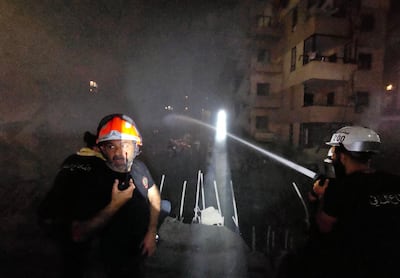Live updates: Follow the latest on Israel-Gaza
Israel bombed Beirut late on Thursday night in its latest breach of a ceasefire, with its military striking what it claimed were Hezbollah drone factories.
The Israeli military ordered residents to leave four densely populated neighbourhoods in Beirut's southern suburbs, where people were celebrating Eid Al Adha. It marked the first such eviction order since April, causing thousands of people to flee the area and causing gridlocked traffic.
The first major strike was carried out shortly after 10pm local time, after a handful of "warning raids" by Israeli drones. At least six attacks were carried out by Israel across several neighbourhoods in the Lebanese capital, sending smoke billowing into the air.
They were a morbid reminder of Israel's war on Lebanon last year, when Beirut came under repeated bombardment.
Israel said it was striking what it called "terror targets" of a Hezbollah aerial unit in the southern suburbs. Israel also carried out attacks on Ain Qana in southern Lebanon after issuing similar eviction threats.
Lebanese President Joseph Aoun condemned the attacks in a statement, calling them a "blatant violation of an international agreement".
He said the strikes demonstrated Israel's “rejection of the requirements of stability, settlement and just peace in our region" and accused Israel of using Lebanon as a “mailbox” to send a message to the US.
Prime Minister Nawaf Salam also condemned the strikes, calling them a "flagrant violation" of the country's sovereignty and UN Security Council Resolution 1701.
In a statement posted on social media, Mr Salam urged the international community to "assume its responsibilities" in deterring further Israeli attacks and pushing for a full withdrawal from occupied Lebanese territories.
Lebanon has accused Israel of breaching the ceasefire more than 3,000 times since it came into effect last November.
Less than two hours earlier, Israeli miltary spokesman Lt Col Avichay Adraee had warned on social media that residents of southern Beirut were "located near facilities belonging to the terrorist organisation Hezbollah" and should leave immediately.
The Israeli army accused Hezbollah of running underground production sites "deliberately established in the heart of the civilian population" in the city. It said the armed group was preparing to increase drone production "for the next war".
"These activities constitute a blatant violation of the understandings between Israel and Lebanon," the army said in a statement.
It said the military "will operate against every threat posed to the state of Israel and its civilians, and will prevent all attempts of the Hezbollah terrorist organisation to re-establish itself".
The strike came on the eve of Eid Al Adha, as many families gather for the holiday. Lebanon's National News Agency reported a "very violent raid" on the suburbs, with smoke rising across the area. There were no immediate reports of casualties.

The strikes "generated renewed panic and fear on the eve of Eid Al Adha", the office of the UN Special Co-ordinator for Lebanon said on social media.
Israeli Defence Minister Israel Katz praised the country's air force for its “perfect execution” of the strikes and said Israel would “continue to enforce the ceasefire rules without any compromise".
Israel holds the “Lebanese government directly responsible for preventing violations of the ceasefire and all terrorist activity against the state of Israel", he added.
Israel has carried out nearly daily strikes in southern Lebanon since the November ceasefire. Attacks on the capital have been rare, however, with Israel most recently striking Beirut's southern suburbs in April.
Under the truce, Hezbollah fighters were to withdraw north of the Litani River, about 30km from the border with Israel, and dismantle military posts further south. Israel was to pull out all of its troops from Lebanon, but has kept forces in five positions it considers to be "strategic".
The Lebanese army has also moved to the south to remove Hezbollah infrastructure there. Mr Salam said on Thursday it had dismantled "more than 500 military positions and arms depots" in the area.
Hezbollah is facing mounting domestic and international pressure to relinquish its remaining weapons, but the group’s officials insist they will not disarm until Israel ends its air strikes and withdraws from the five Lebanese territories.
The Iran-backed group has long resisted calls to disband its armed wing, arguing that its weapons are necessary to defend Lebanon against Israeli aggression.
